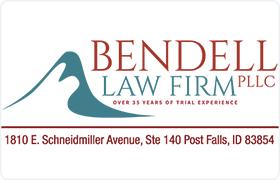Fruitland Criminal Lawyer, Washington
Sponsored Law Firm
-
 x
x

Click For More Info:
-
The Bendell Law Firm, PLLC
1810 E Schneidmiller Ave, Suite 140, Post Falls, ID 83854» view mapCriminal Defense, Accident & Injury Law You Don’t Pay If We Don’t Win
With deep experience and a multi-faceted perspective and understanding of Idaho and Washington law, we can help you achieve the best results in a variety of practice areas.
208-981-0555
Joseph L. Broadbent
Traffic, Federal Appellate Practice, Criminal, Constitutional Law
Status: In Good Standing *Status is reviewed annually. For latest information visit here Licensed: 30 Years
Joshua B Gilstrap
Criminal
Status: In Good Standing *Status is reviewed annually. For latest information visit here Licensed: 24 Years
Melissa Annette May
Juvenile Law, Criminal
Cheryl Taylor
Criminal
Lorinda S. Noble
Juvenile Law, Criminal
 James Bendell Post Falls, ID
James Bendell Post Falls, ID Practice AreasExpertise
Practice AreasExpertise